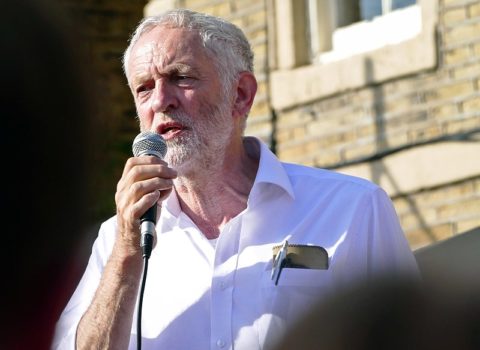Ed West on the decidedly conservative cast of many British voters’ core beliefs:

Jeremy Corbyn, then-Leader of the Labour Party speaking at a Rally in Hayfield, Peak District, UK on 25th July 2018 in support of Ruth George MP.
Photo by Sophie Brown via Wikimedia Commons.
It wasn’t until I was a fairly grown up that I learned just how conservative many Labour voters were. My parents’ Labour-supporting friends had mostly belonged to what Ken Livingstone called ‘the party of the metropolitan pervert’, London types who worked in creative industries or the public sector and held ultra-liberal views (at least for the 90s). But out there in the real world there were all these Labour supporters who were even more Right-wing than my dad, whether on crime, immigration, Europe, sexual relations or pretty much any social issue. They just wanted, in Blackadder’s words, a few less fat bastards eating all the pie.
That is pretty much where the public are now. As Aaron Bastani put it: “The centre ground on domestic policy and public services is Corbynism with a union flag on it and the word ‘British'”.
Although Jeremy Corbyn lost decisively in 2019, many have forgotten the political lesson of the Corbyn era — that it wasn’t his economic policies that put people off, but his lack of patriotism. He came from that long line of Quaker-Unitarian radicals who have always been seen as too sympathetic to Britain’s enemies, whether it was Robespierre, Napoleon, the USSR, Irish republicans or Islamic radicals.
Corbynomics is certainly more popular than what the current Tory Party is offering, especially that served up in the recent mini-budget, after which it could be said that things are developing not necessarily to the Government’s advantage.
I don’t have strong opinions on the aborted 45% tax cut; it didn’t seem very wise, or fair, but I’m not sure how drastic it was; Robert Colvile in The Sunday Times suggests that the proposal was not as bold as people make out. Yet it seems to be hugely unpopular, except with the Institute for Economic Affairs.
But I’m not convinced that makes it bad.
The IEA’s Kristian Niemietz has repeatedly pointed out that free-market economics is generally quite unpopular, and during the depths of the Brexit dispute he wrote a piece opposing what he called “Bregalitarianism”:
The Bregalitarian loves to wallow in faux-indignation every time an opponent – which can be a Remainer, but it can also just be a more cautious, less enthusiastic Brexiteer – mentions the possibility that not everyone who cast a vote on 23 June 2016 was fully aware of all the possible ramifications. “How DARE you suggest that 17.4 million voters are stupid!”, cries the Bregalitarian. “How DARE you be so patronising and insulting!”
I find this Bregalitarian rhetoric deeply disingenuous – and never more so than when free-marketeers engage in it … Here’s a little home truth: if you are a free-marketeer in Britain in 2018, you are part of a small and unpopular minority. The vast majority of the British public disagree with you on virtually everything. There is majority support for a (re-) nationalisation of energy companies, the railways, water and bus companies. There is majority support for rent controls and various price controls.
As a free-marketeer, you probably want, if not fully privatised, then at least mixed systems of healthcare and education, with much greater private sector involvement. If so, you are almost alone in Britain with that view. There is also majority support for a lot more government regulation, a lot more government interference with private business decisions, higher taxes and a larger state.
Indeed, public opinion on economic issues is quite eye-watering: a full 28 per cent of British adults want banks to be run by the state, and 30 per cent even want internet providers nationalised. A quarter want travel agents nationalised.



